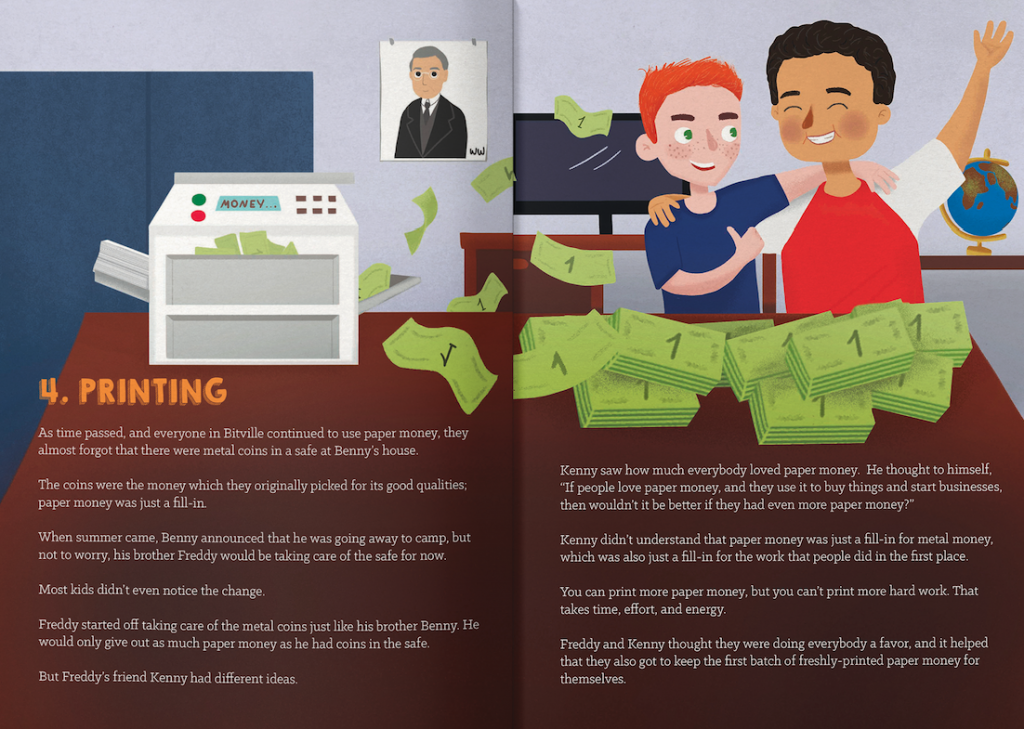
Interview Date : 9th February 2021
I am Rabbi Michael Caras, and I am a teacher mostly for middle and high school students teaching Jewish subjects. I also help out with my community synagogue. I have always had an interest in economics. As a young kid, the idea of, especially, inflation always really fascinated me. I kept hearing it from my father who would speak about the price of things, for example, the price of a movie ticket, a soda, etc. I also grew up as a high school student when the financial collapse happened in the late 2000s.
Why did you write a children’s book About Bitcoin?
I love the idea of brevity. Many people that explain Bitcoin have gotten much better over the past 4 years, but with all these different technical terms, people roll their eyes over it. People, like myself, who don’t come from a tech background, it may sound absurd. When I teach, I want to make things short and concise with analogies and stories. That is the way that I teach my children as well. My oldest daughter is turning 9, but she was 7 when I wrote this book for her and her level of comprehension, so a 7-year-old will be able to read it. The goal was that a Bitcoiner would buy it for a relative’s child as a birthday or a holiday present whose parents don’t understand Bitcoin. Then the parents and children can read together and learn about Bitcoin together. I also have seniors, old people, that don’t understand technology in the slightest, and they wouldn’t understand Bitcoin if they would hear from somebody else. However, if they see it in this children’s book format, they’re going to at least understand what it is.
What do you consider Bitcoin to be?
I think Bitcoin is an economic development that uses technology, and that’s what the book focuses on. It tries to explain Bitcoin from a really simple economic perspective. The technological mechanism behind it has been summarized, because just like I and many others don’t understand how wifi works or how my iPhone works don’t matter. As long as I know that I can face time with my grandmother that’s what matters to me. The same goes for Bitcoin: you only have to understand what you can use it for.
How did you start teaching about Bitcoin to your Jewish community?
I started by giving a presentation to synagogues, youth groups and college students called Bitcoin and Judaism. In a presentation session, I go through the Jewish Bible, the Torah, and talk about what the religious, legal, ethical perspectives of money are, and connect that to how bitcoin can be the next step for further evolution. In the Bible, animals, silver, gold, jewelry, etc. are described as different forms of money at a certain period in ancient history. In recent years, this has developed as fiat currency, and now is further developing again with digital currencies. Everybody has a general idea of what they think money is, but most haven’t put it all together: they don’t know why credit cards are money.
My wife is a professional graphic designer. She has published several books for other people, written books, and illustrated books. So, she was the one that took it from just an idea and turned it into the beautiful illustrated book that it is today.
Does the Bible talk about Money?
Store of value, a medium of exchange, and a unit of account are seen in different verses in the Bible. For Jewish people, there’s some specific minutia as far as different religious practices. I explain that in a more general sense that money is technology. So, at certain times it was cattle other times it was gold or silver bowls, and today it is the dollar or yen. So, money is a technology, and just like every other technology or medicine, we don’t use the medicine of the ancient days that doesn’t help us in our modern-day, but we look at whatever technology there’s today to help us. A central Jewish perspective we have is that everything in the world is created to help us serve our purpose, make a better world and help each other. Thus, whatever technology we can use to live a better life, helps money to improve to be a better store of value is something that we should follow
Why did you send 300 Copies of the Children’s book to Congress?
This was when Mark Zuckerberg had to testify before Congress regarding Libra. Most senators, congressmen, and congresswomen didn’t understand anything about blockchains and digital currency technologies. Most of the representatives just didn’t seem like they had a good understanding of what Bitcoin was. So, I figured my book’s reading level wouldn’t be overwhelming for them. So, I sent a book to Mr. Trump to the White House (which you can do). Later, when more of these hearings happened, I started to wonder if other people wanted to help sponsor maybe $100~$200 to cover the book cost to send it to congress representatives. Surprisingly, over the course of a couple of weeks, people responded and were very supportive of the idea, and that made it possible to send out 300 copies of the book to representatives of congress. I got a letter from former President Trump and some senators and some congresspeople, but most of them went unanswered. I assume that their assistants probably got their hands on them and swept them off before many representatives got them. I hope that they went to good places but it was a great project to do.
How well is congress informed about Bitcoin today?
Congress today has more members that are informed about Bitcoin, like the senator from Wyoming who is really out full-fledged bitcorner, Cynthia Loomis. She even has self custody of her Bitcoin. Besides, there may be another 5 to10 congressmen that have shown real support for Bitcoin. So, the status has changed a lot in not only the business world but in the political world too. The widespread general understanding of Bitcoin has changed dramatically. Even the richest person on earth, Elon Musk, bought 1.5 billion dollars of Bitcoin. Many people who don’t understand Bitcoin fully still think that it is probably here to stay.
How can we overcome the mental blockage of Bitcoin?
I don’t expect older people to understand Bitcoin naturally, but I expect younger people to. Younger people don’t ask the same questions about Bitcoin that older people do. They are native to digital currency native and grew up with everything digitally. When a one-year-old baby picks up a book, the baby will try to scroll on the cover of a physical book. I helped one of my neighbors, an older woman, with setting up new wifi, and she asked me where I learned how to do that. If you are born into it, you just know. So, I don’t think we’re going to need to explain Bitcoin to the younger generation, especially the children that were born after Bitcoin was invented. It is just like we don’t need to explain what an iPhone is to kids, like you have to do with your parents or your grandparents. That mental blockage will be gone.
How can we help each other without connections to power?
I am a strong proponent of charity. I think that we all have a moral obligation and civil obligation to take care of each other to help each other. I think it is essential to being a human being because people are suffering and people do need help. I don’t think that the money supply should run by the central government and at the whims of politics. The idea of the Cantillon effect is that money is most valuable and has the strongest effect the closest to its creation. In other words, the central bank prints the money and gives it to the people that are the most well connected. In all these cases, the idea and the hope are that it goes and helps everybody to help the economy at large. However, the people that are the most connected are always going to be helped and taken care of. I reference this idea briefly and use the phrase “the boys that we’re printing the money were happy because they always got the first batch of the newly printed money.” I don’t want a few elites to have the power to print the money and decide where the money goes. I think that it should just be a free market where we all will have the obligation either through taxation or through goodwill to provide for each other.
What was your introduction to Bitcoin?
I had read some of the works from Austrian economics as well as Milton Friedman, and Peter Schiff, and so I was interested in the general idea of economics. I also grew up in the technological age and I always had some tech things whether it was a CD player, Compaq computer, iPod touch, or something but I was always involved in gadgets. When I found out about Bitcoin, it piqued my interest. I’d seen enough of what I considered digital currencies, which I always thought of like video game currencies, for example, MMO RPGs, World of Warcraft, Neopets, etc., and I knew that some of these were traded. In the beginning, I lumped Bitcoin into that same category until 2017. That was when my brother, who works in the high-tech field in Jerusalem and Tel Aviv in Israel. He got me introduced to it, and I have stuck with Bitcoin since. I don’t work in the crypto industry, and I have my own life but it’s a passion so I spend a lot of time trying to share it with people.
What does Bitcoin encourage religiously?
As a religious person, there are many things that I like about Bitcoin. It encourages saving and long-term investments. I’m a family man and have 6 children, and you have to look at how you are investing for the future of your family, whether that’s physically, spiritually, or financially. So, when you realize the dollar doesn’t seem like a good investment because it’s losing purchasing power, but bitcoin is seemingly a good opportunity for a long-term savings technology, that itself makes you want to be involved. That is the main value proposition of Bitcoin. When people read news headlines that say “it’s for crime or unsavory activities”, well, the main value proposition of Bitcoin for the average person is to be able to plan for a better future for their family. The fact that some people can use technology for negative purposes is just a happenstance. That’s true for every technology, and whatever technology is going to exist, on the edges anyways.
What is our current system?
I think it’s essentially an unfair system where the goal is to make connections with politically powerful people in the business. The goal is not to produce the most for the world, to make the best product, to make the lowest prices nor to provide the most jobs. Now those can be overlapped. The amount of money that has to be spent on lobbying and being connected to the central bank is tremendous. So, this state-centralization of power is not a good idea. I think that there’s a better idea to have a more localized and decentralized system as far as schooling, education, etc. I think the concept of money and power is too powerful, therefore everyone should be left to take custody of their money by themselves.
How does fiat have an advantage over gold?
Fiat currency does have advantages over gold. Gold is not very portable nor divisible, but gold is not very saleable over space. Gold doesn’t transfer well either. It’s just not a good medium of exchange because you cannot even buy a cup of coffee with gold. In the Bible gold was not the primary medium exchange and use of money. It was silver because silver is much more divisible and cheaper, so you can transfer with it much better. The word in Hebrew and the Torah for money is the word silver, “kesef”, and it still is today. Thus, gold has disadvantages and is not perfect money. Fiat did have advantages over it through the modern banking system before Bitcoin was invented. Today, Bitcoin had advantages over both gold and fiat. Gold has failed to protect us backing money previously: in the 1930s when gold was confiscated or during the 1970s when we went off the gold standard. I didn’t think it would be able to come back and retain its place because it failed the first time, why would it be any different the second time. However, bitcoin changed the game as it provides self custody, it is verifiable, it is divisibility and portable. The advantage it has over fiat is that it is malleable.
Interviewer , Editor : Lina Kamada
【Disclaimer】
The Article published on this our Homepage are only for the purpose of providing information. This is not intended as a solicitation for cryptocurrency trading. Also, this article is the author’s personal opinions, and this does not represent opinion for the Company BTCBOX co.,Ltd.



